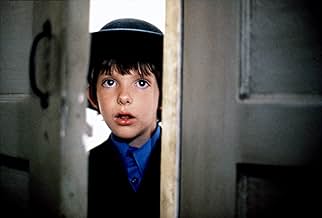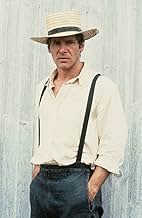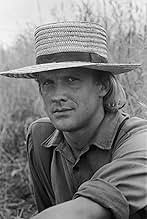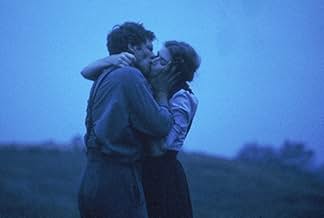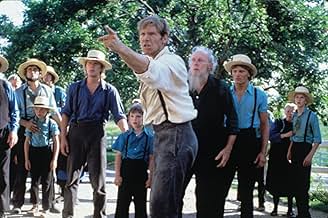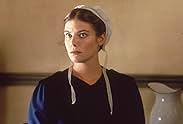Ein Amisch-Junge wird Zeuge eines Mordes; der Polizist John Book taucht im Land der Amischen unter, um ihn bis Prozessbeginn zu beschützen.Ein Amisch-Junge wird Zeuge eines Mordes; der Polizist John Book taucht im Land der Amischen unter, um ihn bis Prozessbeginn zu beschützen.Ein Amisch-Junge wird Zeuge eines Mordes; der Polizist John Book taucht im Land der Amischen unter, um ihn bis Prozessbeginn zu beschützen.
- 2 Oscars gewonnen
- 13 Gewinne & 28 Nominierungen insgesamt
Zusammenfassung
Reviewers say 'Witness' is acclaimed for its crime thriller elements and cultural exploration, highlighting Harrison Ford's nuanced performance. The Amish community portrayal, though sometimes romanticized, adds depth. The romantic subplot is noted for its subtlety. Peter Weir's direction and cinematography are praised, yet some criticize plot inconsistencies and pacing. The soundtrack, though fitting, occasionally clashes with the film's tone.
Empfohlene Bewertungen
Although I suppose "Blade Runner" is the movie that showed Harrison Ford could do something outside of "Star Wars", I personally think "Witness" was one of the most important movies of his career, because it's a complete departure from a science fiction storyline, and therefore paved the way for all the Tom Clancy stuff and other movies that featured him as a romantic hero. Featuring a rich, startling performance from Ford and a powerful turn by Kelly McGillis (who had only appeared on "One Life to Live", a TV movie and the marvelous film "Rueben, Rueben" at that point in her career) "Witness" still manages to amaze with the suspense that Weir generates in the film.
The contrast between the gritty urban police precinct and the bucolic Amish farm country is one of the best things about the film. Book dressed in a blue shirt and black trousers several inches too short for him, looking like the proverbial fish out of the water, is a sight to behold. All of a sudden he's back in the nineteenth century -- no electricity, no cars, no TV or computers. He might as well be on another planet. And the Amish are as different from him as space aliens; gentle, quiet pacifists, hardworking and industrious, intent on keeping the outside world as far from them as possible. They are neighborly and cooperative; the barn-raising scene is inspiring to watch. We feel sympathy for these quiet, decent people as the outside world keeps encroaching, and see them trying to navigate a horse and buggy on the Interstate. Book has to try to fit into this world, and he gives it his best shot. He joins in the barn-raising, does odd chores around the farm. But the Amish, while they respect his abilities, hold him at arm's length. For one thing, he's falling in love with the young widow Lapp, whose feeling for him is mutual. For another, his assimilation is only skin-deep; on a trip into town, when a group of local louts start pestering the Amish, Book chips in with a right to the lout's nose that leaves his face a bloody mess. It's going to prove his undoing; back in his precinct, the narcotics agent and the captain have gotten wind of his hideout, and now they come to shut him up once and for all, and silence Samuel as well. 'Witness' is not an action/adventure blockbuster like the movies that made Ford a household name, but it doesn't need pyrotechnics to stand out. It's a well-crafted, well-acted, eminently satisfying movie.
Overall rating: 9 out of 10.
The contrast between the gritty urban police precinct and the bucolic Amish farm country is one of the best things about the film. Book dressed in a blue shirt and black trousers several inches too short for him, looking like the proverbial fish out of the water, is a sight to behold. All of a sudden he's back in the nineteenth century -- no electricity, no cars, no TV or computers. He might as well be on another planet. And the Amish are as different from him as space aliens; gentle, quiet pacifists, hardworking and industrious, intent on keeping the outside world as far from them as possible. They are neighborly and cooperative; the barn-raising scene is inspiring to watch. We feel sympathy for these quiet, decent people as the outside world keeps encroaching, and see them trying to navigate a horse and buggy on the Interstate. Book has to try to fit into this world, and he gives it his best shot. He joins in the barn-raising, does odd chores around the farm. But the Amish, while they respect his abilities, hold him at arm's length. For one thing, he's falling in love with the young widow Lapp, whose feeling for him is mutual. For another, his assimilation is only skin-deep; on a trip into town, when a group of local louts start pestering the Amish, Book chips in with a right to the lout's nose that leaves his face a bloody mess. It's going to prove his undoing; back in his precinct, the narcotics agent and the captain have gotten wind of his hideout, and now they come to shut him up once and for all, and silence Samuel as well. 'Witness' is not an action/adventure blockbuster like the movies that made Ford a household name, but it doesn't need pyrotechnics to stand out. It's a well-crafted, well-acted, eminently satisfying movie.
Overall rating: 9 out of 10.
Won Oscars for Best Writing, Screenplay Written Directly for the Screen, and Best Editing. Nominated for five more Oscars including Best Picture, Best Actor, Harrison Ford, and Best Director Peter Weir. Weir Directed the 'The Year of Living Dangerously', and 'The Truman Show'. After seeing it maybe 10 times, I find it is one of those infrequent stories that still draws my attention. This places it in the company of pictures like 'The Godfather', and some others which stand the test of repeat viewings over time. Kelly McGillis is the film's intelligent and talented secret weapon. Her performance makes me wonder where she is these days. She is an Amish widow from a rural Amish community. On a trip to the city her little boy witnesses a murder in the restroom of a train station. Police investigator Harrison Ford finds himself targeted along with the boy by corrupt cops in his unit that did the murder. He is hurt in a shootout and hides with the Amish. He wears Amish clothes, and labors with the men of the community as he rebuilds his strength. An attraction naturally develops between the McGillis and Ford charactors. The chemistry is remarkably intelligent, and authentically portrayed. Their worlds are seperated by a cultural gulf. They are drawn by each other, and respect one another. The contrasts are drawn clearly between the quaint honesty and almost dreamlike serenity of the Amish, and the horrible violence intruding upon them from the outside world. The resolution of the story should not be given away to someone who has not seen the movie. This film is a different kind of thriller in more ways than one. It's makers kept it intelligent, instead of resorting to another pyrotechnic joyride. -Robert Hartman-
I just recently watched this movie in my Development of Film class. We're studying the Social Drama. Last week we watched "Fury" with Spencer Tracy, so this week we watched a contemporary film in the genre. I have to give it up for Peter Weir! He did a spectacular job!
The premise is intriguing. A young Amish boy goes to the bathroom in a train station and witnesses a bloody murder. Enter Philadelphia cop John Book (Harrison Ford). Now, we had several discussions about this film and I started to realize some flaws that didn't exactly come clear in my mind at the time. First of all, a little innocent Amish boy isn't going to witness something that grisly and recover that well. Living in an Amish environment, he probably doesn't even know the definition of the word "violence." So the boy wouldn't be able to return to his native environment and go on with his life like usual. He'd keep having nightmares and flashbacks. He'd be traumatized 'til the day he dies! However, I have to note Lukas Haas delivered a terrific performance. I'm not sure how much appraise he got for this moderately thankless role. For a boy of his age to take on a role like that, I have to commend him. Lukas, in recent years, has concentrated on more independent works like "Boys" with Wynona Ryder and the underrated "johns" with David Arquette, in which he plays a gay prostitute. He's still a fine actor, and I'm impressed to see his advancement to more grown-up roles, but many probably forgot about him. So I think he should be remembered for that little role, even to this day. But typical Hollywood, Harrison Ford agrees to do a film--he's the star! And the whole subplot with the little boy gets pushed aside. Now, Harrison was terrific in this movie--probably why I wasn't bothered too much about him being the center of attention--and I think he's a very underrated actor (sure he's widely known, but recognize him more as a macho action hero than an actor), but I think if Weir decided to expand that subplot it would've made a more interesting film.
Kelly McGillis is convincing as the boy's Amish mother, who gets swept away by Book. Even as an Amish woman, I think she looked beautiful. I haven't exactly been traveling around Amish country, but I don't know how often you would find an Amish woman that beautiful. Plus, that scene where she's sponge-bathing topless--Wow! That brings me to another point. I like how Weir never actually decided to put a sex scene to demonstrate the relationship between her and Book. In the aforementioned sponge-bathing scene, there's a long period where they just stare at each other and there's absolutely no dialogue! I found that very impressive. It's a very erotic scene, without them actually having to jump into bed together. That's something you rarely see in the movies. The sexual tension between the two characters is simply impressed by their mannerisms. Danny Glover is convincingly frightening as the villain. Also look for an early performance by Viggo Mortensen. He doesn't have many--in fact, I don't if he has any--speaking parts, but he's in quite a few scenes.
There's a lot of good fish-out-of-water comedy when the city-born Book tries to learn the ways of the Amish. I was cracking up when Harrison puts on the Amish garb, with the bottom of his pants above his ankles. That's a picture worth a thousand words. Weir is fascinated by clashes in cultures, and it's highly evident in many scenes from this movie. Those scenes provide some good comic relief. This may be considered typical Hollywood, but I loved the scene where Harrison Ford gets out of the chariot (now as one of the Amish) to beat the crap out of one of the thugs who was giving them trouble. That was an awesome scene! Weir also captures some beautiful, sometimes breathtaking, shots of the scenery. The music is great too, especially in the barn-raising scene. The ending is well-done, and I liked how it wasn't one of those walk-into-the-sunset conclusions. I don't want to give anything away, but that was one of the non-typical Hollywood elements of the film.
Despite its now-discovered flaws, I still love this movie and wouldn't mind watching it on many repeat viewings. It's just a fascinating, wonderfully made piece of cinema that will hold its place in the history of celluloid. I urge you to witness this triumphant work!
My score: 9 (out of 10)
The premise is intriguing. A young Amish boy goes to the bathroom in a train station and witnesses a bloody murder. Enter Philadelphia cop John Book (Harrison Ford). Now, we had several discussions about this film and I started to realize some flaws that didn't exactly come clear in my mind at the time. First of all, a little innocent Amish boy isn't going to witness something that grisly and recover that well. Living in an Amish environment, he probably doesn't even know the definition of the word "violence." So the boy wouldn't be able to return to his native environment and go on with his life like usual. He'd keep having nightmares and flashbacks. He'd be traumatized 'til the day he dies! However, I have to note Lukas Haas delivered a terrific performance. I'm not sure how much appraise he got for this moderately thankless role. For a boy of his age to take on a role like that, I have to commend him. Lukas, in recent years, has concentrated on more independent works like "Boys" with Wynona Ryder and the underrated "johns" with David Arquette, in which he plays a gay prostitute. He's still a fine actor, and I'm impressed to see his advancement to more grown-up roles, but many probably forgot about him. So I think he should be remembered for that little role, even to this day. But typical Hollywood, Harrison Ford agrees to do a film--he's the star! And the whole subplot with the little boy gets pushed aside. Now, Harrison was terrific in this movie--probably why I wasn't bothered too much about him being the center of attention--and I think he's a very underrated actor (sure he's widely known, but recognize him more as a macho action hero than an actor), but I think if Weir decided to expand that subplot it would've made a more interesting film.
Kelly McGillis is convincing as the boy's Amish mother, who gets swept away by Book. Even as an Amish woman, I think she looked beautiful. I haven't exactly been traveling around Amish country, but I don't know how often you would find an Amish woman that beautiful. Plus, that scene where she's sponge-bathing topless--Wow! That brings me to another point. I like how Weir never actually decided to put a sex scene to demonstrate the relationship between her and Book. In the aforementioned sponge-bathing scene, there's a long period where they just stare at each other and there's absolutely no dialogue! I found that very impressive. It's a very erotic scene, without them actually having to jump into bed together. That's something you rarely see in the movies. The sexual tension between the two characters is simply impressed by their mannerisms. Danny Glover is convincingly frightening as the villain. Also look for an early performance by Viggo Mortensen. He doesn't have many--in fact, I don't if he has any--speaking parts, but he's in quite a few scenes.
There's a lot of good fish-out-of-water comedy when the city-born Book tries to learn the ways of the Amish. I was cracking up when Harrison puts on the Amish garb, with the bottom of his pants above his ankles. That's a picture worth a thousand words. Weir is fascinated by clashes in cultures, and it's highly evident in many scenes from this movie. Those scenes provide some good comic relief. This may be considered typical Hollywood, but I loved the scene where Harrison Ford gets out of the chariot (now as one of the Amish) to beat the crap out of one of the thugs who was giving them trouble. That was an awesome scene! Weir also captures some beautiful, sometimes breathtaking, shots of the scenery. The music is great too, especially in the barn-raising scene. The ending is well-done, and I liked how it wasn't one of those walk-into-the-sunset conclusions. I don't want to give anything away, but that was one of the non-typical Hollywood elements of the film.
Despite its now-discovered flaws, I still love this movie and wouldn't mind watching it on many repeat viewings. It's just a fascinating, wonderfully made piece of cinema that will hold its place in the history of celluloid. I urge you to witness this triumphant work!
My score: 9 (out of 10)
Harrison Ford is one of those actors that often times just shows up and then there lies his character. This is the Harrison Ford school of acting. Not the case in "Witness". I won't begin to wonder what would have caused this change of pace, but it was quite a surprise to see. Peter Weir is a favorite director of mine, mainly for his life changing films (for the viewer and the characters alike), like "Picnic at Hanging Rock" and "Fearless" ... and I have sadly waited a very long time to get around to this one. Even 17 years after its initial release, it seems to still stand up with themes that truly speak. I expected some sort of a courtroom drama, but instead found a film that presents a dichotomy between old world and new world values and sensibilities and really asks whether change is always for the best. This is a profound and exciting thriller.
'Witness' is about a guy who is a total product of the big city - he's a tough cop, he relies on cars, phones, and guns - who hides at an Amish farm to prevent a boy (the witness) and himself from being found by the killers.
The film is less about Harrison Ford learning to live among the Amish as it is the Amish learning to live with Ford. He is a man who at first glance has no matching ideals. The film is fantastic on that level, especially thanks to Peter Weir's direction, who brilliantly shows Ford gradually becoming accepted by the Amish men.
There is very little dialogue among the characters, and Rachel (McGillis) talks even less, not because she doesn't have anything to say, but because Amish rules of life don't seem to allow her to. They are presented as a quiet people, so McGillis has the difficult task of making Rachel speak without dialogue, and she does it well, which carries over to Ford (he got an Oscar nomination, she didn't).
It's only at the climax of the film, when the action takes over that the film begins to weaken. The filmmakers seem to have some kind of answer to how the killer's storyline should be resolved, but it's not very good.
Despite the flaw, the film is excellent based on the performances of the cast, the editor who had to put all the dialogue-less scenes together (and later, won the Oscar for it), and Weir's masterful handling of the story.
The film is less about Harrison Ford learning to live among the Amish as it is the Amish learning to live with Ford. He is a man who at first glance has no matching ideals. The film is fantastic on that level, especially thanks to Peter Weir's direction, who brilliantly shows Ford gradually becoming accepted by the Amish men.
There is very little dialogue among the characters, and Rachel (McGillis) talks even less, not because she doesn't have anything to say, but because Amish rules of life don't seem to allow her to. They are presented as a quiet people, so McGillis has the difficult task of making Rachel speak without dialogue, and she does it well, which carries over to Ford (he got an Oscar nomination, she didn't).
It's only at the climax of the film, when the action takes over that the film begins to weaken. The filmmakers seem to have some kind of answer to how the killer's storyline should be resolved, but it's not very good.
Despite the flaw, the film is excellent based on the performances of the cast, the editor who had to put all the dialogue-less scenes together (and later, won the Oscar for it), and Weir's masterful handling of the story.
The Life and Times of Harrison Ford
The Life and Times of Harrison Ford
Take a look back at Harrison Ford's movie career in photos.
Wusstest du schon
- WissenswertesIn preparation for her role, Kelly McGillis lived with an actual Amish widow and her seven children for a while before filming began to get the speech cadence down and to observe the daily life of an Amish widowed mother.
- PatzerJohn Book's Volkswagen hit the birdhouse and broke its windshield. Later the car is seen in the barn with an unbroken windshield.
The windshield is cracked and damaged, but still reasonably intact when Book attempts to start the car. When Book hit the birdhouse and it fell on the windshield, it looked to be far more severely damaged.
- Crazy CreditsThe closing shot of John Book driving away in his car passing Daniel provides an initial backdrop for the end credits.
- Alternative VersionenIn the original theatrical stereo mix, just after John Book is shot, we see a close-up of his gun and a voice-over from an earlier conversation Book had with the captain. We hear the words: "Who else knows about this? "Just you and me." In the DVD version, which contains a remixed 5.1 track, we see the close-up of the gun and then it segues to Book's sister waking up Rachel and her son Samuel, but the voice-over is missing. In addition to that, there are also new sound effects like ambient noise and especially gunshots added throughout. However Arrow's 2023 4K release restores the theatrical mix which contains the original sound effects and the missing parking garage dialogue.
- Soundtracks(What a) Wonderful World
(1959)
Written by Sam Cooke, Herb Alpert and Lou Adler
Performed by Greg Chapman
Courtesy of Abkco Music, Inc.
Top-Auswahl
Melde dich zum Bewerten an und greife auf die Watchlist für personalisierte Empfehlungen zu.
Details
- Erscheinungsdatum
- Herkunftsland
- Sprachen
- Auch bekannt als
- Testigo en peligro
- Drehorte
- Produktionsfirmen
- Weitere beteiligte Unternehmen bei IMDbPro anzeigen
Box Office
- Budget
- 12.000.000 $ (geschätzt)
- Bruttoertrag in den USA und Kanada
- 68.706.993 $
- Eröffnungswochenende in den USA und in Kanada
- 4.539.990 $
- 10. Feb. 1985
- Weltweiter Bruttoertrag
- 68.707.459 $
- Laufzeit1 Stunde 52 Minuten
- Farbe
- Sound-Mix
- Seitenverhältnis
- 1.85 : 1
Zu dieser Seite beitragen
Bearbeitung vorschlagen oder fehlenden Inhalt hinzufügen




